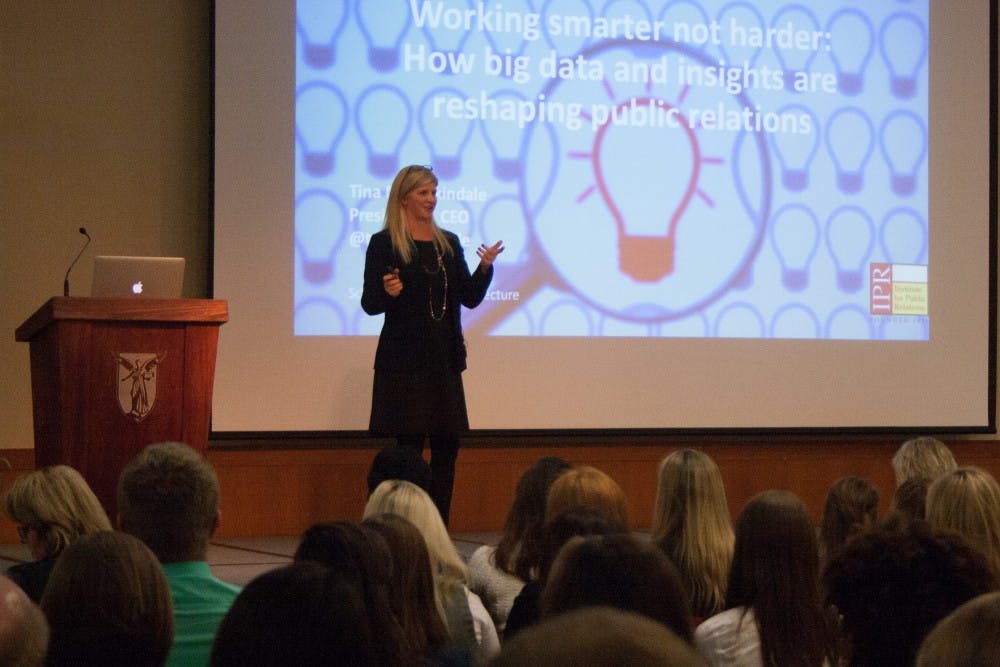In a world that has become increasingly more digital, one on-campus speaker pointed out some of the benefits technology and data can have on many students' futures.
Tina McCorkindale, president and CEO of the Institute for Public Relations, a non-profit that does PR-related research, shared her insights on data and how beneficial it can be in the world of public relations in the L.A. Pittenger Student Center Nov. 9.
McCorkindale was the 38th Vernon C. Schranz distinguished lecturer. She started her presentation with a group selfie before discussing the theme of "Working Smarter, Not Harder."
“I’m not telling you you’re not going to work hard — you’re gonna work really, really hard,” McCorkindale said.
She referenced current technology, such as IBM Watson and case studies that used user-generated data, to show attendees how technology is shaping the way different industries are changing.
She also defined the four types of media: paid, earned, shared and owned. Paid media and sponsored posts are trying to become more organic, while owned media is done by corporations. Shared media is content created by users on platforms such as social media, and owned media is traditional.
“Here’s what’s happening with us as communicators: our world is becoming more complex," McCorkindale said. "We have so many options now, thanks to digital, that these are things that we have to consider. This is what our world is going to be and our future is right now, what we’re dealing with.”
McCorkindale said there are several areas where public relations students need analytics and data to do their job better.
“We can help understand our target audiences, we can help with strategy, help with our valuation … it could be gathering research before a campaign, it could be gauging the audiences to see what they think, it could be researching audiences to see what they think, it could be evaluating the success of their campaign,” McCorkindale said. “And it’s not even just their campaign, it’s competitors’.”
In addition, McCorkindale debunked five myths of research, including the myth to always trust data.
“The polls said that Hillary was gonna win. Why do you think that is? There’s multiple reasons why," she said. "One, the way that we do polls is flawed. We’re always trying to find the best formula for how to do polls … what you say isn’t necessarily what you’re going to do. When you survey people on their attitudes and opinions, it doesn’t actually mean that they’re going to go to the polls and vote.”
At the end, a Q&A session took place, and McCorkindale offered her advice on networking.
“You have to know what’s going on in life to succeed. There’s all of these little things that you’re going to read that have a tremendous impact on a day-to-day basis. Writing is so important … writing is the lifeblood of what we do in PR. If you can’t write, I won’t tell you to change your major because you can get better at writing and you should work at writing,” she said. “And I want you to be great editors. If you type something up, don’t ever send it out. You should, if you have to spend time in each sentence and you get to a sentence and you’re like, ‘I don’t know if this sounds right but I’m sure it’s fine,’ no, it’s not fine. If there’s any middling in your brain that something’s wrong, go back and redo it.”
Christa Burkholder, a first-year public relations graduate student, attended her fifth Schranz lecture because she is passionate about being able to take data and transform the way businesses are looked at and run, and how people interact with each other through data.
“My biggest takeaway from tonight would definitely be to be willing to explore what kind of data is out there and to really be curious all the time and not be afraid to ask questions, because usually, those questions are kind of what helps drive where the conversation’s going, and I think that’s so important in public relations,” Burkholder said.





